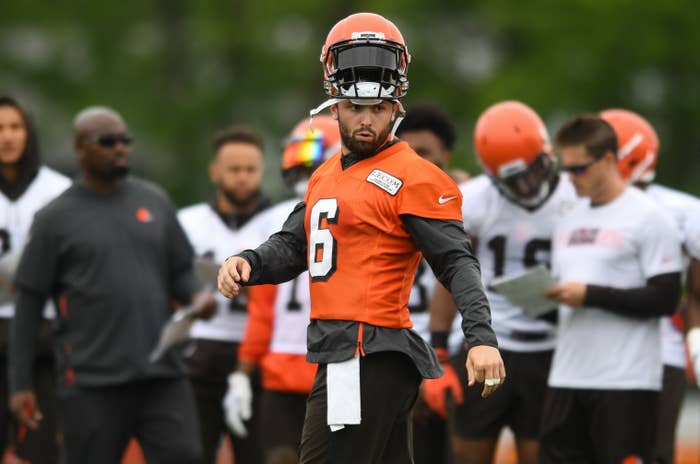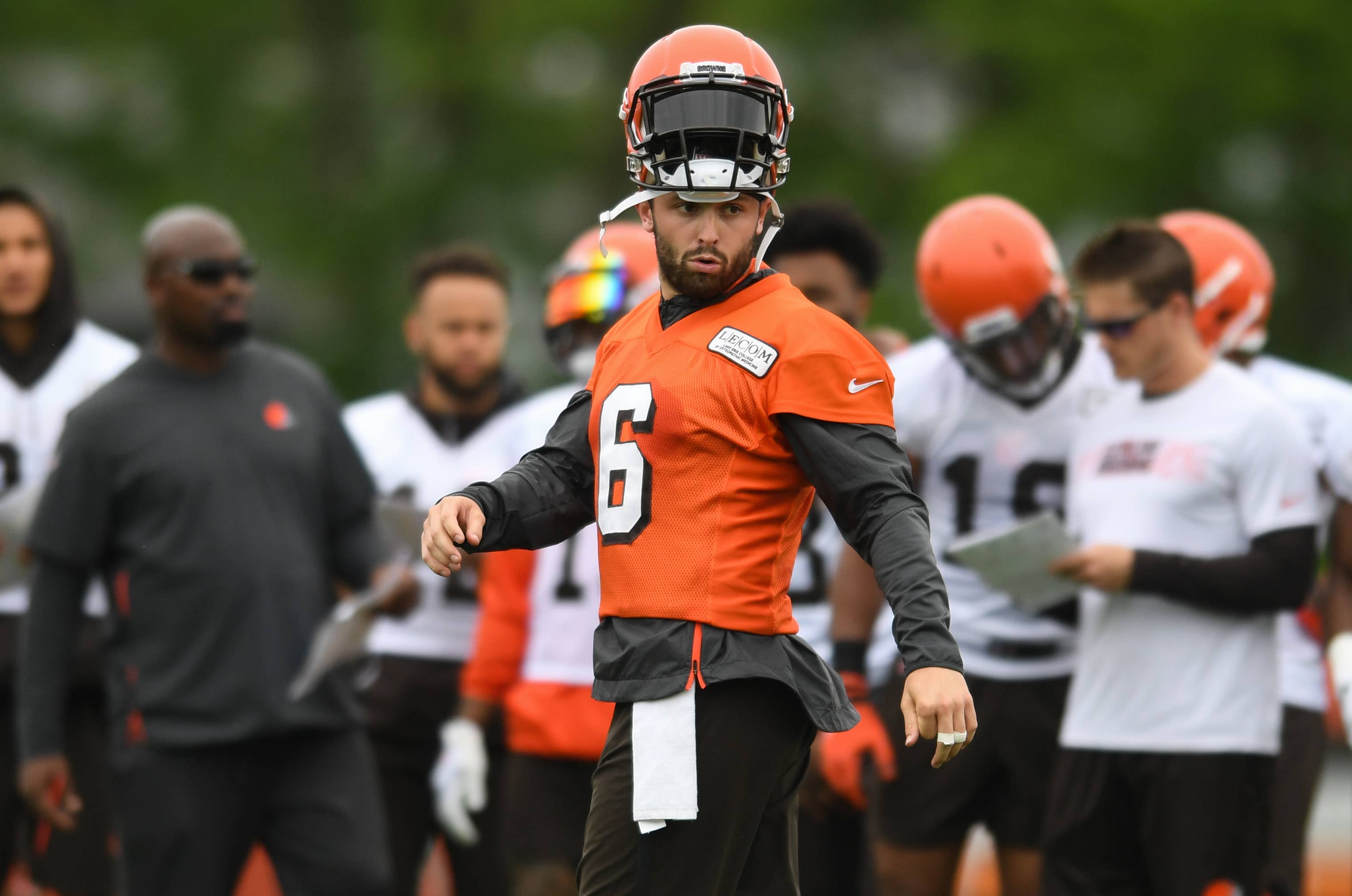
Slow down. Pump the breaks. I get it. A Browns player, let alone a Cleveland Browns QB, winning MVP? Wild, I know.
Baker Mayfield had a fine rookie season, but let’s not act like quarterback progress is always linear. Just because Mayfield broke a couple of records doesn’t mean he will become the next Patrick Mahomes. There are no guarantees in sports, and especially not at the QB position in the NFL.
But should we really dismiss Baker Mayfield’s MVP case? Recent history tells us this theory is actually more plausible than you think. Vegas certainly isn’t dismissing it, with most oddsmakers giving the second-year QB around the fifth-best odds to take home the prestigious hardware.
While we have to see the Browns actually prove they can match the high expectations set out for them on the field, there’s a legitimate argument that Baker’s supporting cast is the best in the NFL. The additions of Odell Beckham Jr. and Kareem Hunt to an already explosive offense featuring Jarvis Landry, Nick Chubb, and David Njoku has the Browns ready to break out.
Mayfield making that second-year jump boils down to two things: immense skill and football maturity. Mayfield was able to break the rookie touchdown record despite not receiving any first-team snaps throughout training camp and a head coach who had zero intention of giving him the starting role at any point in 2018.
He parlayed that lack of respect into a comeback win in Week 3 over the Jets in primetime, and then six more wins for a franchise that had failed to win a single game in 2017. He seized the leadership role and became the franchise leader in the span of six weeks.
Mayfield finished with 3,725 yards passing, 27 touchdowns, and 14 interceptions over the course of 13.5 games. Those are staggering numbers for a rookie who was working within two offensive structures and a relatively depleted wide receiving group for a good portion of the season.
The turmoil of the Hue Jackson era ended last season, after a dreadful loss to the Steelers in Week 8, but brighter days were ahead with Freddie Kitchens taking over as the Browns offensive coordinator. Kitchens and Baker immediately clicked and turned the Browns into one of the most dynamic offenses in the NFL, which eventually led to the Browns hiring Kitchens as their full-time head coach in January.
If we stretch Mayfield’s eight games last season with Kitchens over the course of 16 games, Mayfield would have ended with 4,509 yards and 38 touchdowns. Those numbers would put Baker squarely in the MVP discussion. The second-year leap for recently drafted quarterbacks is a tangible thing. We have seen it before. Start with the 2016 quarterback class, which featured two highly regarded names: Jared Goff and Carson Wentz. Both players had uneven rookie seasons.
Mayfield making that second-year jump boils down to two things: immense skill and football maturity. Mayfield was able to break the rookie touchdown record despite NOT receiving any first-team snaps throughout training camp and a head coach who had zero intention of giving him the starting role at any point in 2018.
Goff was stuck in Jeff Fisher’s football purgatory and only mustered a 54 percent completion rate, five touchdowns, and seven interceptions across seven starts. His performance led to a staggeringly low 18.9 QBR (quarterback rating). Not the ideal rookie season for the first overall pick.
Yet, come year two, Sean McVay enters the fold. The head coaching savant helped create the situations Goff found most comfortable, and Goff saw his profile skyrocket. Goff came out of the gates on fire in 2017 and changed the narrative. He finished with a much improved 61.1 percent completion percentage, 3,804 yards passing, 28 touchdowns, and only seven interceptions.
Goff led the Rams to an 11-4 record in his 15 starts and pushed himself into the distant MVP conversation. The Year 2 jump found legs.
Carson Wentz, on the other hand, went through a different and more direct path. In his rookie year, Wentz was uneven, but the flashes were there. In Doug Pederson’s offense, Wentz threw for 3,782 yards, 16 touchdowns and 14 interceptions. Solid, but nothing to write home about in a rookie year.
Then the explosion. In Year 2 in Pederson’s offense, Wentz found more comfort and better weapons. The Eagles added Alshon Jeffery to Nelson Agholor and Zach Ertz, and the offense became dominant, with Wentz running the show.
The North Dakota State product went for 3,296 passing yards, 33 touchdowns, and just seven interceptions in only 13 games. Wentz led the Eagles to an 11-2 record before tearing his ACL in Los Angeles. He was the clear leader for the MVP award at the time, but his injury opened the door for Tom Brady to sneak in and win the award over the course of the final three weeks.
However, at that point, we had more evidence of the Year 2 jump. The 2017 class, though, leads to even more evidence to the compelling nature of this theory. Deshaun Watson, selected 12th overall, had a solid rookie season, with 19 passing touchdowns in just six total starts before he also lost his season to an ACL tear that occurred in practice. Watson was easily on track to set the rookie touchdown passes record before the tear.
So how did Year 2 look for Watson? Even better. He cut down his interception percentage, led his team to 11 wins, and threw for a staggering 68.3 completion percentage, 4,165 yards, and 26 touchdowns. The leap was there yet again.
Now we get to the ultimate example: Patrick Mahomes. The 10th selection in the same draft, Mahomes only saw time in one game his rookie season—a meaningless Week 17 matchup. Basically, Mahomes had a redshirt year during his rookie campaign—a rare thing in this era of immediate production desires in a rookie contract. The second-year quarterback lit the league on fire with 5,097 yards passing, 50 passing touchdowns against only 12 interceptions, and a 66 percent completion rate.
Simply put, Mahomes had one of the league’s best quarterback seasons in modern history. He was a human highlight reel. His immense skill mixed perfectly with fantastic play-calling and design from coach Andy Reid and electric talent around him in the form of Tyreek Hill, Kareem Hunt, Sammy Watkins, and Travis Kelce.
So how does this all translate to Mayfield? Quite frankly, look at the formula above for those quarterbacks who pushed that Year 2 leap. They all entered the MVP race during their second season. The player needs immense skill, quality skill talent around him, a crafty and savvy play-caller, and a team that wins an abundance of football games. Mayfield checks every box.
The Browns have one of the league’s best receiver groups in OBJ, Jarvis Landry, Antonio Callaway, David Njoku, and Rashard Higgins. The running back talent is somehow more impressive than the receiving talent. Not only do the Browns have rookie standout Nick Chubb and pass-catching threat Duke Johnson, they added Kareem Hunt after his release from Kansas City, and he figures to make an impact the back half of 2019, when his eight-game suspension ends.
Mayfield has an abundance of weapons at his disposal, but it doesn’t just end there. The pairing of new head coach Freddie Kitchens and Mayfield for the last half of 2018, after Hue Jackson’s firing, was when the rookie quarterback ignited. Mayfield became a different quarterback under Kitchens and his innovative ways to improve protection, get his receivers loose in the secondary, and allow Mayfield to work off script.
The formula to predict potential MVP level players is obviously inexact and we can’t presume things will go perfectly for Mayfield and the Browns, but when you check the history of those who have found the Year 2 jump, Mayfield makes sense. Mix in new offensive coordinator Todd Monken and his propensity for pushing the ball downfield to chase those explosive plays and you can see the ingredients that could lead to a breakout season for Mayfield and the Browns.
Sure, it sounds crazy, and most will scoff at the notion that Mayfield is an actual MVP candidate, but I would tell you to have this conversation about Wentz before 2017, and to do the same for Mahomes before 2018. These young quarterbacks can thrive in the right situation, and Mayfield surely has that situation.
Things could always go sideways, as the NFL is a vicious league that can chew up young quarterbacks at any moment, but if you remove emotion and look at recent trends, Mayfield makes plenty of sense. He won’t be the betting favorite, and rightfully so, but taking a long-shot look at him for the award is worth your time.
Ultimately, it comes down to how often the Browns win. Winning drives the attention, and with winning come appealing stat lines for Mayfield. If the Browns win like many believe they will, the story will be Mayfield. Stories create awards. If the Browns do something they haven’t done since 1989, win the division, or since 2002, make the playoffs, Mayfield will be right in the thick of the conversation.
As crazy as that may currently sound.


